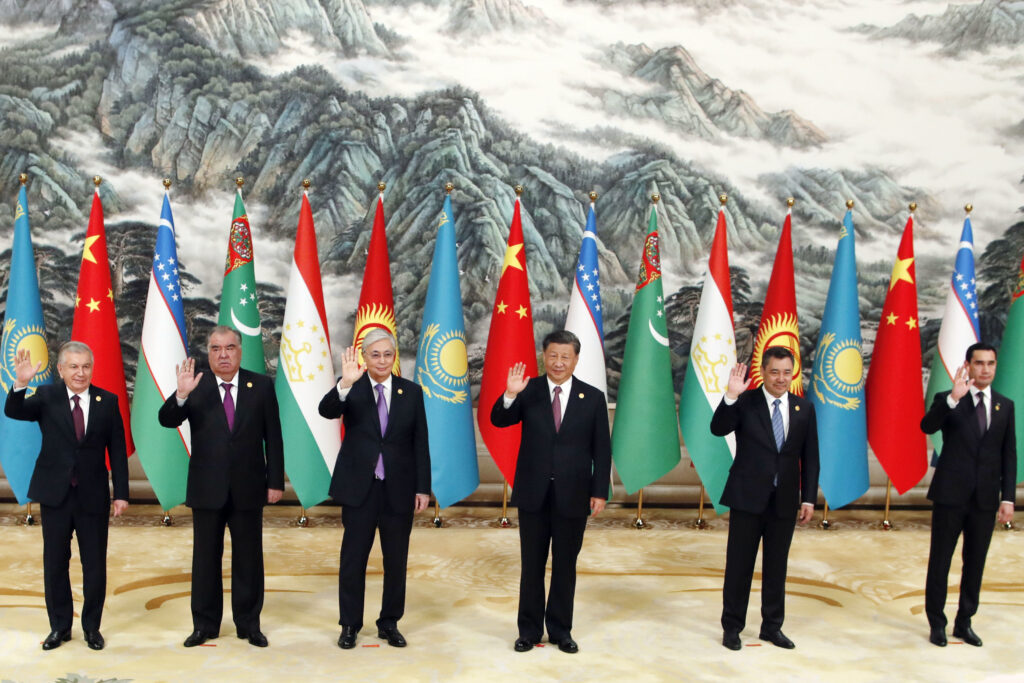Kazakhstan, Kyrgyzstan, Tajikistan, Turkmenistan and Uzbekistan had a good run in 2023. Bucking the trend of the past decade, the region did not experience major conflicts, attempts at regime change or largescale violence. The ongoing energy crisis, exacerbated by a dry and hot summer, was perhaps the only blot on the landscape. But all five countries improvised solutions, edging towards increasing the share of renewable sources of power generation.
Central Asia’s economic performance exceeded expectations. It added 4.8 per cent of GDP across the board, with Tajikistan and Kazakhstan leading the way, clocking 7.3 per cent and 5.0 per cent growth respectively.
The war in Ukraine was a major factor in this success. All countries strengthened economic engagement with Russia. They filled the vacuum created by the departure of international firms from Russia and benefitted from the relocation of Russian firms, capital and citizens to their territory. Helping Moscow with running secretive imports of banned Western goods and technology proved particularly lucrative for many Central Asian entrepreneurs.
Politically, the region’s leaders remained unswervingly neutral on the conflict in Ukraine. Throughout 2023, they found themselves at the centre of an unprecedented diplomatic effort by the West to condemn Moscow’s aggression or at least uphold the sanctions regime against it. High-profile visitors included the US Secretary of State Anthony Blinken and French President Emmanuel Macron. Historic summits in the C5+1 format were hosted by the US President Joe Biden and German Chancellor Olaf Scholz.
This flurry of activity achieved very little. Blinken’s Kazakh counterpart told him that Astana ‘does not feel any threats or risks from the Russian Federation’ and the summits’ statements did not even mention Ukraine. In the wake of the September 2023 sojourn in Berlin, Kazakhstan announced its intention to ban the export of 106 dual-use items to Russia, only to backtrack in short order and criticise the sanctions regime itself.
Moscow also courted the Central Asian republics. It did not push these nominal allies beyond maintaining positive neutrality and as 2023 came to an end Russian President Vladimir Putin felt confident about their goodwill. C5+1 summits with China and the Gulf Cooperation Council further assured the region that it would be able to survive economically even if secondary sanctions were applied.
Intra-regional dynamics improved considerably during 2023. Following bloody border clashes in 2022, the demarcation of contested territories between Kyrgyzstan and Tajikistan proceeded in ‘an atmosphere of friendship and mutual understanding’. Both sides expressed hope that by early 2024 all issues in the longest-running conflict in Central Asia would be resolved.
In September 2023, the Fifth Сonsultative Meeting of the Heads of State of Central Asia took place in Dushanbe. Hopes ran high as all participants agreed that regional economic cooperation would be of mutual benefit.
But in the end, the summit failed to advance any practical initiatives apart from harmonising youth policy and setting up a commission to study ground transport connectivity. Tajikistan and Turkmenistan continued to abstain from signing the regional friendship treaty proposed at the Fourth Consultative Meeting in 2022 on the grounds of its alleged incongruence with their national legislation. Still, local experts remained upbeat about the future of the Central Asian summits, predicting that by 2030 they would achieve collective action on transport corridors and water and energy management.
Prospects for regional security cooperation were dampened by growing disagreement among the Central Asian countries on the Taliban. The states sharing a border with Afghanistan — Tajikistan, Turkmenistan and Uzbekistan — became increasingly concerned about threats coming from the south.
Their apprehension about the Taliban’s ability to combat terrorism and maintain peace was augmented by the implementation of Afghanistan’s Qosh Tepa irrigation scheme. This would deprive Turkmenistan and Uzbekistan of about 15 per cent of the water from the transborder Amu Darya river. In August 2023 the presidents of Tajikistan, Turkmenistan and Uzbekistan held a meeting in Ashgabat and sent a clear message to Kabul that they could resort to forceful anti-Taliban joint action if necessary.
Kazakhstan and Kyrgyzstan were not invited to the meeting. And in December 2023 Kazakhstan effectively defied the ‘Ashgabat troika’ by removing the Taliban from its list of terrorist organisations.
Two elections highlighted the resilience and renewal of Central Asia’s authoritarian systems. Uzbekistan had a constitutional referendum in April 2023, which granted incumbent President Shavkat Mirziyoyev the right to run for office again after he serves two terms. Mirziyoyev then called snap elections in July, scoring 87 per cent of the vote, which positioned him well to stay in power until 2037.
In Kazakhstan, President Kassym-Jomart Tokayev dismissed the parliament, triggering early elections in March 2023. The president’s Amanat party won a comfortable majority. Five other parties in the lower house constitute a token opposition at best, providing an outlet for social grievances and minimising the risk of street protests — such as those that rocked the country in 2022.
Central Asia’s relative calm and prosperity are likely to continue in 2024. The main risks are geopolitical and related to the war in Ukraine. Russia’s potential defeat or the West’s ultimatum about enforcing secondary economic sanctions may unravel the business model Central Asia has developed.
The region’s strongmen do not anticipate such scenarios. In a New Year’s interview to a Kazakh newspaper, Tokayev spoke confidently about Putin’s global leadership and his country’s unshakeable strategic partnership with Russia. He chose to stay silent on the greatness of Biden or the European Union.
Kirill Nourzhanov is Associate Professor at the Centre for Arab and Islamic Studies, The Australian National University.
This article is part of an EAF special feature series on 2023 in review and the year ahead.

